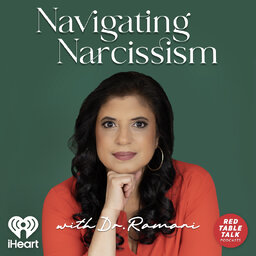My Famous Parents are Narcissists with Juliet Landau
Award-winning actress Juliet Landau (Drusilla on Buffy the Vampire Slayer & Angel, Tim Burton’s Ed Wood, Bosch and TNT’s Claws) reveals the long-lasting impact of balancing on a “razor’s edge” as a child to avoid upsetting her parents: beloved, award-winning actors Martin Landau and Barbara Bain.
Watch and Subscribe to our YouTube Channel @NavigatingNarcissismPod
Follow me on social:
- Instagram - @doctorramani
- Pod Instagram - @navigatingnarcissismpod
- Facebook - @doctorramani
- Twitter - @DoctorRamani
- YouTube: Dr. Ramani’s YT - DoctorRamani
I want to hear from you, too. Have a toxic topic you want me to explore? Email me at askdrramani@redtabletalk.com. I just might answer your questions on air
Guest Bio:
Juliet Landau is an actress, director, producer & writer. As an actress, highlights include Drusilla on BUFFY THE VAMPIRE SLAYER & spin-off ANGEL and co-starring in Tim Burton’s ED WOOD as Loretta King. Last season she recurred as Rita Tedesco on Amazon’s BOSCH. This season she’s recurring as Cordelia on TNT’s CLAWS. Juliet just helmed her visionary, multi-award winning, feature directorial debut, A PLACE AMONG THE DEAD. Cast: Gary Oldman, Ron Perlman, Robert Patrick, Lance Henriksen and Anne Rice, appearing for the only time ever in a scripted movie. Further extensive acting, directing, writing credits available. Juliet’s a member of The Actors Studio, Women In Film, Film Independent, The Alliance Of Women Directors, BAFTA and an alum of Sundance Collab.
Guest Information:
- Twitter: @julietlandau
- Instagram: @juliet_landau
- Website: https://www.julietlandau.com/
The Ultimate A PLACE AMONG THE DEAD Blu-Ray with Over 4 hours of Extras is available here: https://tinyurl.com/apatdbn or discounted here: https://tinyurl.com/apatdindie
This podcast should not be used as a substitute for medical or mental health advice. Individuals are advised to seek independent medical advice, counseling, and/or therapy from a healthcare professional with respect to any medical condition, mental health issue, or health inquiry, including matters discussed on this podcast.
EXECUTIVE PRODUCERS Jada Pinkett Smith, Ellen Rakieten, Dr. Ramani Durvasula, Meghan Hoffman, Fallon Jethroe VP PRODUCTION OPERATIONS Martha Chaput CREATIVE DIRECTOR Jason Nguyen LINE PRODUCER Lee Pearce PRODUCER Matthew Jones, Aidan Tanner ASSOCIATE PRODUCER Mara De La Rosa ASSOCIATE CREATIVE PRODUCER Keenon Rush HAIR AND MAKEUP ARTIST Samatha Pack AUDIO ENGINEER Calvin Bailiff EXEC ASST Rachel Miller PRODUCTION OPS ASST Jesse Clayton EDITOR Eugene Gordon POST MEDIA MANAGER Luis E. Ackerman POST PROD ASST Moe Alvarez AUDIO EDITORS & MIXERS Matt Wellentin, Geneva Wellentin, VP, HEAD OF PARTNER STRATEGY Jae Trevits Digital MARKETING DIRECTOR Sophia Hunter VP, POST PRODUCTION Jonathan Goldberg SVP, HEAD OF CONTENT Lukas Kaiser HEAD OF CURRENT Christie Dishner VP, PRODUCTION OPERATIONS Jacob Moncrief EXECUTIVE IN CHARGE OF PRODUCTION Dawn Manning
In 1 playlist(s)
Navigating Narcissism with Dr. Ramani
We all have to deal with narcissists. Now, it’s time to heal from them. In this groundbreaking serie…Social links
Follow podcast
Recent clips

Evan Rachel Wood on Surviving Her Abusive Relationship with Marilyn Manson
1:41:41

Ask Dr. Ramani: How To Go "No Contact" with a Narcissist
1:09:53

Extreme Post-Separation Abuse with Jo Fonda
1:03:46
 Navigating Narcissism with Dr. Ramani
Navigating Narcissism with Dr. Ramani